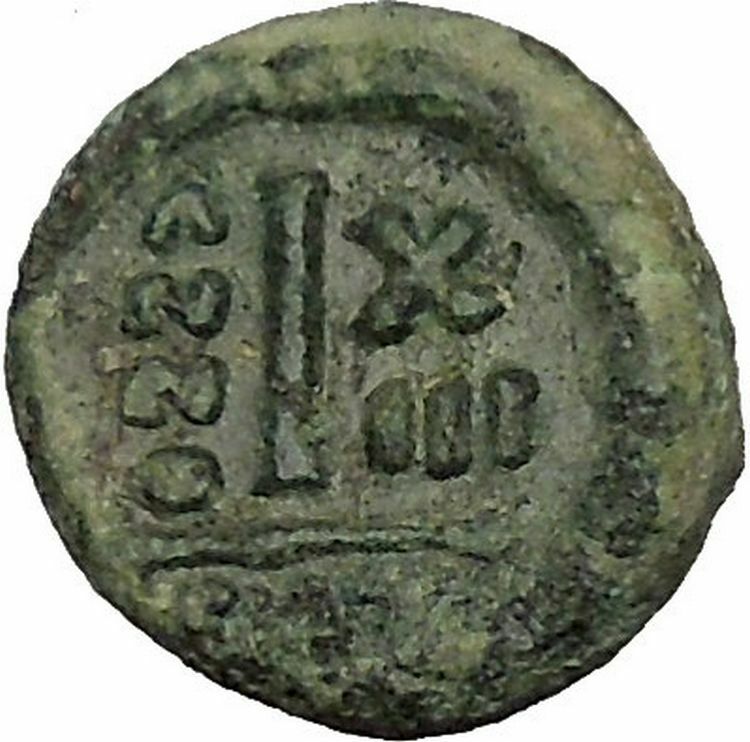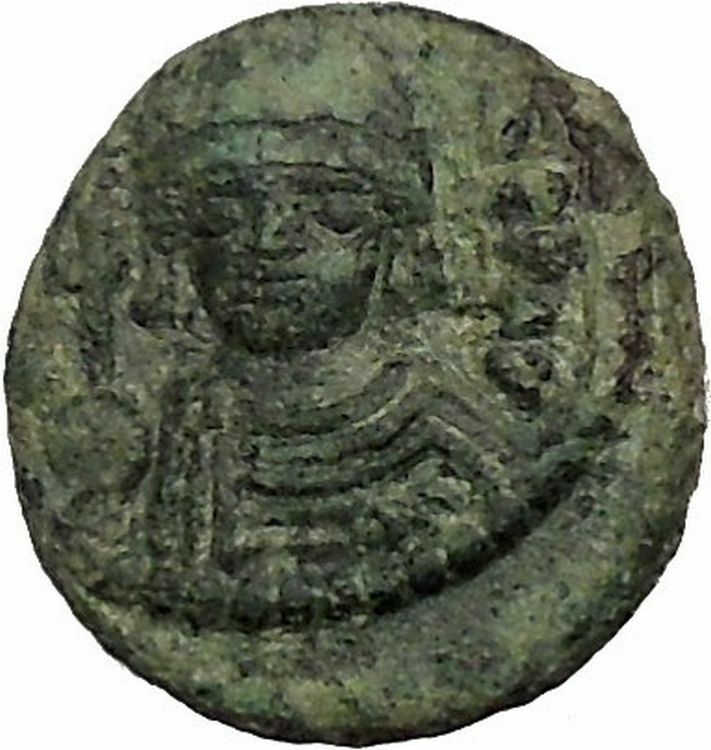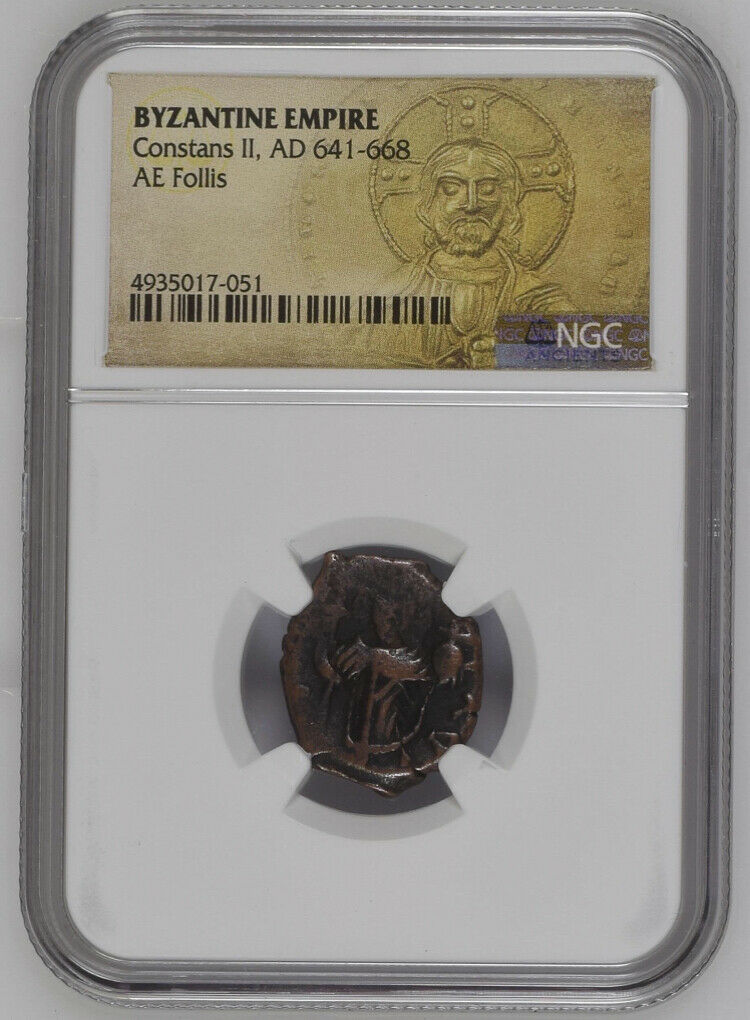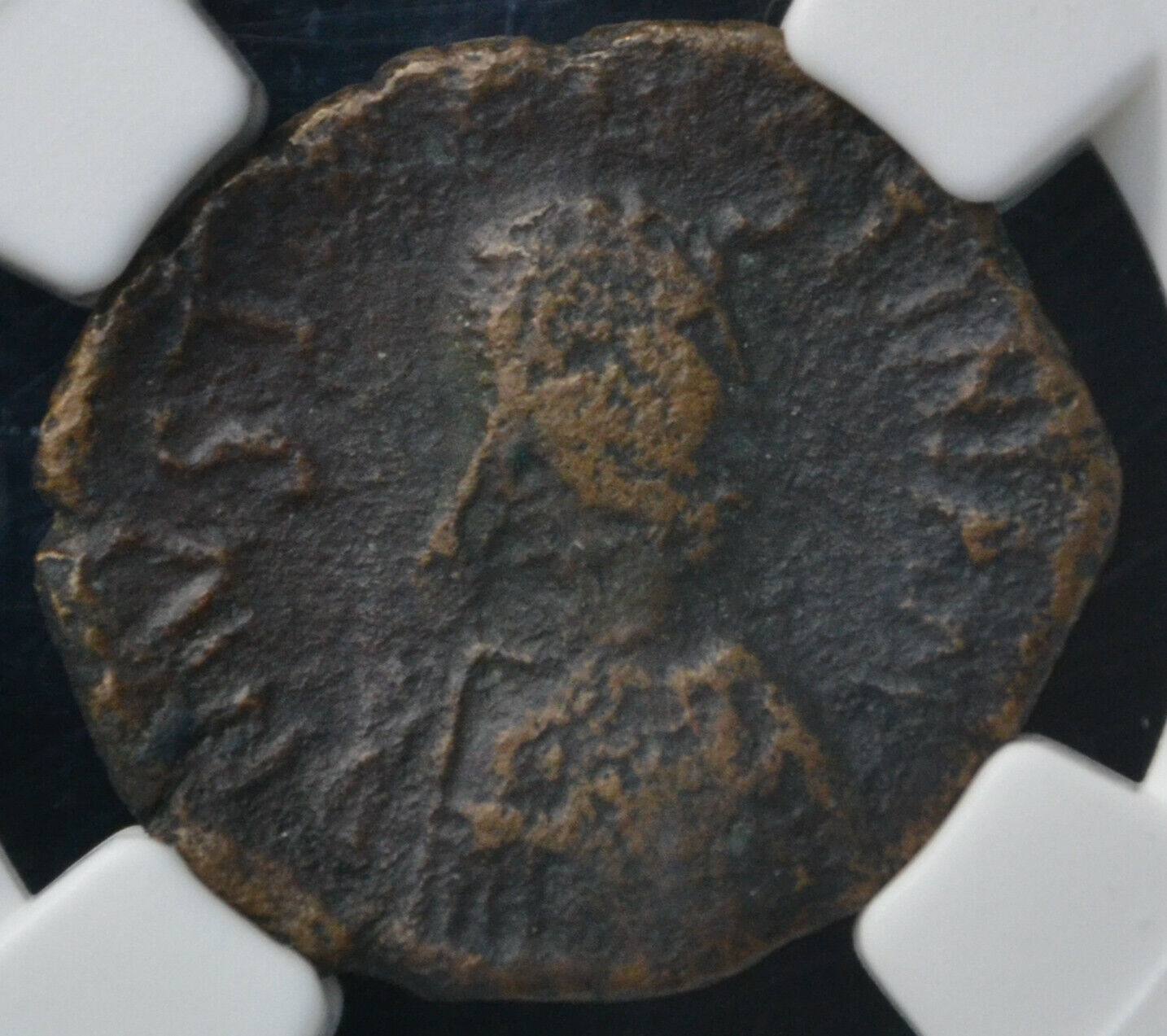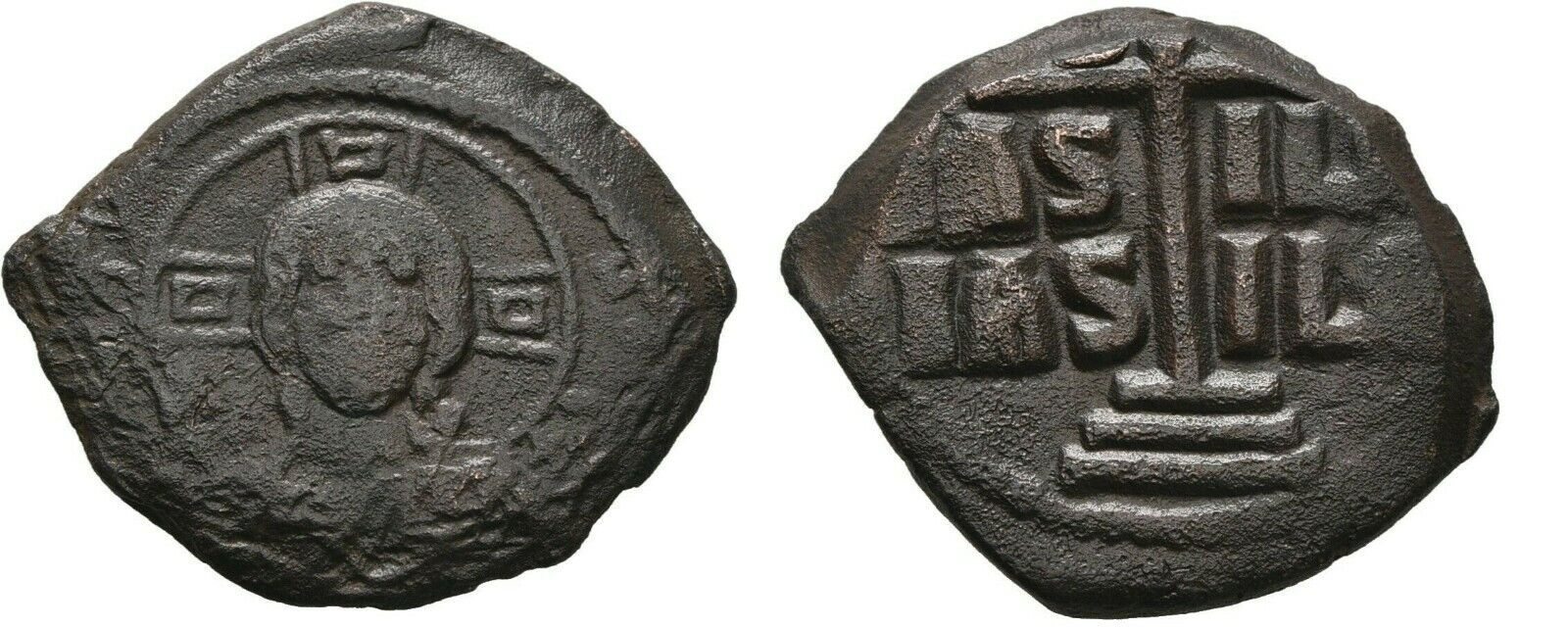-40%
HERACLIUS 622AD Catania Sicily Decanummium Ancient Byzantine Coin i54026
$ 137.28
- Description
- Size Guide
Description
Item:i54026
Authentic Ancient Coin of:
Byzantine Empire
Heraclius - Emperor: October 5, 610 A.D. - January 11, 641 A.D. -
Bronze Decanummium 14mm (2.86 grams) Catania in Sicily mint, struck circa 622-623 A.D.
Reference: Spahr 35; Anastasi 53; Sear 885.
D N HERACLIPPAVg, bust facing, bearded, wearing cuirass, paludamentum and flat-topped crown with cross. Large I; on left, A/N/N/O; on right, X/III; in exergue CAT.
You are bidding on the exact item pictured, provided with a Certificate of Authenticity and Lifetime Guarantee of Authenticity.
Flavius Heraclius Augustus
(
Greek
:
Φλάβιος Ἡράκλειος
; known in English as
Heraclius
, or
Herakleios
; c. 575 - February 11, 641) was a
Byzantine Emperor
of
Armenian
origin, who ruled the
Eastern Roman Empire or Byzantine Empire
. He was in power for over thirty years, from October 5, 610 to February 11, 641 and was responsible for abandoning the use of
Latin
in favour of the
Greek
language in official documents, further
Hellenising
the Empire. His rise to power began in 608, when he and his father, also named
Heraclius
, the viceregal
Exarch of Africa
, successfully led a revolt against the unpopular usurper
Phocas
.
Heraclius' reign was marked by several military campaigns. The year Heraclius came to power, the Byzantine Empire was threatened on multiple fronts. Heraclius immediately had to fight the
invasion of
the Empire by the
Sassanians
who were ruled by the Persian king
Khosrau Parvez
. The first battles of the campaign ended in defeat for the Byzantines; and the Persian army fought their way to the gate of Constantinople, the capital. The Persian army attacked the city from the east while an army of Avars, Slavs, and Bulgars attacked it from the west and from the sea. However, because Constantinople was protected by a strong navy and impenetrable walls, Heraclius was able to avoid total defeat. Soon after this, he initiated a campaign to rebuild and reform the military. Following this success Heraclius moved into Persian territory in 627 and won a decisive battle at
Nineveh
defeating the Persian army. He was the first Emperor to
engage the Muslims
, and, in the Islamic world, he is seen as something of an ideal ruler who studied the
Qur'an
, was a true believer of Islam, and viewed
Muhammad
as the true prophet, the messenger of God.
After his victory over the
Sassanid Empire
, he faced a new threat with the rising power of
Islam
. The Persians were quickly defeated by the Islamic forces and in 634 the latter invaded Syria, defeating the emperor's brother
Theodore
. Heraclius eventually lost Syria in a string of battles. Within a short period of time the Arabs would conquer Mesopotamia, Armenia, and Egypt.
In religious matters, Heraclius is remembered as the driving force in converting the peoples migrating to the
Balkan Peninsula
. At his request
Pope John IV
(640-642) sent
Christian
teachers and missionaries to the
Dalmatia
, newly
Croatian
Provinces settled by
Porga
, and his clan who practiced
Slavic
paganism. He tried to repair the schism in the Christian church in regard to the
Monophysites
by promoting a compromise doctrine called
Monothelitism
; however, this philosophy was rejected as
heretical
by both sides of the dispute.
//
Early life
Origins
Heraclius was the eldest son of
Heraclius the Elder
and Epiphania, an
Armenian
family from
Cappadocia
. Beyond that, there is little specific information known about his ancestry. His father was a key general during Emperor
Maurice's
war with
Bahrām Chobin
, usurper of the
Sassanid Empire
, during 590. After the war, Maurice appointed
Heraclius the Elder
to the position of
Exarch
of
Africa
.
Revolt against Phocas and accession to Emperor
In 608, Heraclius the Elder renounced his loyalty to the Emperor
Phocas
, who had overthrown Maurice six years earlier. The rebels issued coins showing both Heraclii dressed as
consuls
, though neither of them explicitly claimed the imperial title at this time.
[6]
Heraclius' younger cousin
Nicetas
launched an overland invasion of
Egypt
; by 609, he had defeated Phocas' general
Bonosus
and secured the province. Meanwhile, the younger Heraclius sailed eastward with another force via
Sicily
and
Cyprus
.
As he approached
Constantinople
, he made contact with leading leaders and planned an attack to overthrow
aristocrats
in the city, and soon arranged a ceremony where he was crowned and acclaimed as emperor. When he reached the capital, the
Excubitors
, an elite Imperial Guard unit led by Phocas' son-in-law
Priscus
, deserted to Heraclius, and he entered the city without serious resistance. When Heraclius captured Phocas, he asked him, "Is this how you have ruled, wretch?" Phocas said in reply, "And will you rule better?" With that, Heraclius became so enraged that he beheaded Phocas on the spot. He later had the genitalia removed from the body because Phocas had raped the wife of Photius, a powerful politician in the city.
On October 5, 610, Heraclius was crowned for a second time, this time in the Chapel of St. Stephen within the Great Palace, and at the same time married Fabia, who took the name
Eudokia
. After her death in 612, he married his niece
Martina
in 613; this second marriage was considered
incestuous
and was very unpopular.
[9]
In the reign of Heraclius' two sons, the divisive Martina was to become the center of power and political intrigue. Despite widespread hatred for Martina in Constantinople, Heraclius took her on campaigns with him and refused attempts by
Patriarch
Sergius to prevent and later dissolve the marriage.
War against Persia
To the brink of defeat
During his
Balkan Campaigns
, Emperor
Maurice
and his family were murdered by
Phocas
in November 602 after a mutiny.
[10]
Khosrau II
(Chosroes) of the
Sassanid Empire
had been restored to his throne by Maurice and they had remained allies.
3]
[A
Thus, the Persian King Khosrau II seized the pretext to attack the Eastern Roman Empire, and reconquer the Roman province of Mesopotamia.
[11]
Khosrau had at his court a man who claimed to be Maurice's son Theodosius; and Khosrau demanded that the Romans accept this Theodosius as Emperor.
The war initially went the Persians' way, partly because of Phocas' brutal repression and the succession crisis that ensued as the general Heraclius sent his nephew
Nicetas
to attack
Egypt
, enabling his son Heraclius the younger to claim the throne in 610. Phocas, an unpopular ruler who is invariably described in historical sources as a "tyrant", was eventually deposed by Heraclius, who sailed to Constantinople from
Carthage
with an icon affixed to the prow of his ship.
By this time, the Persians had conquered Mesopotamia and the Caucasus, and in 611 they overran Syria and entered Anatolia. A major counter-attack led by Heraclius two years later was decisively defeated outside
Antioch
by
Shahrbaraz
and
Shahin
, and the Roman position collapsed; the Persians devastated parts of Asia Minor, and captured
Chalcedon
across from Constantinople on the
Bosporus
. Over the following decade the Persians were able to conquer
Palestine
and Egypt (by mid-621 the whole province was in their hands) and to devastate Anatolia,
4]
[A
while the
Avars
and
Slavs
took advantage of the situation to overrun the
Balkans
, bringing the Roman Empire to the brink of destruction. In 613, the Persian army took
Damascus
with the help of the
Jews
, seized
Jerusalem
in 614, damaging the
Church of the Holy Sepulchre
and capturing the
True Cross
and afterwards capturing
Egypt
in 616.
With the Persians at the very gate of Constantinople, Heraclius thought of abandoning the city and moving the capital to Carthage, but was convinced to stay by the powerful church figure
Patriarch Sergius
. Safe behind the walls of Constantinople, Heraclius was able to sue for peace in exchange for an annual tribute of: a thousand talents of gold, a thousand talents of silver, a thousand silk robes, a thousand horses, and a thousand virgins to the Persian King.
[17]
The peace allowed him to rebuild the Empire's army by slashing non-military expenditure, devaluing the currency, and melting down, with the backing of Patriarch Sergius, Church treasures to raise the necessary funds to continue the war.
[18]
Byzantine Empire strikes back
On April 5, 622, Heraclius left Constantinople, entrusting the city to Sergius and general
Bonus
as regents of his son. He assembled his forces in Asia Minor, probably in
Bithynia
, and, after he revived their broken morale, he launched a new counter-offensive, which took on the character of a holy war; an
acheiropoietos
image of Christ was carried as a military standard.
The Roman army proceeded to Armenia, inflicted a defeat on an army led by a Persian-allied Arab chief, and then won a victory over the Persians under Shahrbaraz. He would stay on campaign for several years. On March 25, 624 Heraclius left again Constantinople with his wife,
Martina
, and his two children; after he celebrated
Easter
in Nicomedia on April 15, he campaigned in the Caucasus, winning a series of victories in Azerbaijan and Armenia against Khosrau and his generals Shahrbaraz, Shahin and
Shahraplakan
. In 626 the Avars and Slavs besieged Constantinople, supported by a Persian army commanded by Shahrbaraz, but the siege ended in failure (the victory was attributed to the icons of the Virgin which were led in procession by Sergius about the walls of the city), while a second Persian army under Shahin suffered another crushing defeat at the hands of Heraclius' brother Theodore.
With the Persian war effort disintegrating, Heraclius was able to bring the
Gokturks
of the
Western Turkic Khaganate
,
Ziebel
, who
invaded Persian Transcaucasia
. Heraclius exploited divisions within the Persian Empire, keeping the Persian general
Shahrbaraz
neutral by convincing him that Khosrau had grown jealous of him and ordered his execution. Late in 627 he launched a winter offensive into Mesopotamia, where, despite the desertion of his Turkish allies, he defeated the Persians under
Rhahzadh
at the
Battle of Nineveh
. Continuing south along the Tigris he sacked Khosrau's great palace at Dastagird and was only prevented from attacking Ctesiphon by the destruction of the bridges on the Nahrawan Canal. Discredited by this series of disasters, Khosrau was overthrown and killed in a coup led by his son
Kavadh II
, who at once sued for peace, agreeing to withdraw from all occupied territories. In 629 Heraclius restored the
True Crosss
to
Jerusalem
in a majestic ceremony.
Heraclius took for himself the ancient Persian title of "
King of Kings
" after his victory over Persia. Later on, starting in 629, he styled himself as
Basileus
, the Greek word for "sovereign", and that title was used by the Roman Emperors for the next 800 years. The reason Heraclius chose this title, over previous Roman terms such as Augustus, has been attributed by some scholars to having to do with Heraclius' Armenian origins.<="" a="">
<="" a="">
<="" a="">
Heraclius' defeat of the Persians had been the end game in a war that had been on and off for almost 800 years. It was then that
Alexander the Great
had totally defeated the Persians. After Heraclius' victory over the Persian Empire left it in disarray which it never recovered. In 633 the new Islamic State slowly devoured the Persians until the
Muslim conquest of Persia
led to the end of the
Sassanid Empire
in 644, and the
Sassanid dynasty
in 651.
War against the Arabs
Background
The Islamic Prophet
Muhammadd
had recently succeeded in unifying all the
nomadic
tribes of the
Arabian Peninsula
. The Arabs, who had been too divided in the past to pose a military threat, now comprised one of the most powerful states in the region, and were animated by their new conversion to
Islam
. Heraclius fell ill soon after his triumph over the Persians and never took the field again.
Islamic sources record that Heraclius dreamt of the coming Arab invasion. Historian
Al-Tabari
wrote that Heraclius dreamt of a new kingdom of the "circumcised man" that be victorious against all its enemies. After telling his court his dream his patricians who did not know of the rise of Islam in Arabia, "advised him to send orders to behead every Jew in his dominion." It was only when a
Bedouin
trader speaking of a man uniting the tribes of Arabia under a new religion was brought before the Emperor did the Heraclius and his court realize that the kingdom of the "circumcised man" was not the Jews but the new Islamic Empire. When the Muslim Arabs attacked
Syria
and
Palestine
in 634, he was unable to oppose them personally in battle. Although he remained strategically in charge of operations, his generals failed him in battle. The
Battle of Yarmouk
in 636 resulted in a crushing defeat for the larger Roman army; within three years, the
Levant
had been lost again. By the time of Heraclius' death, on February 11, 641, most of Egypt had fallen as well.
Islamic view of the Emperor
[36]
Owing to his role as the Eastern Roman Emperor at the time Islam emerged, he was remembered in
Arabic literature
, such as the Islamic
hadith
and
sira
. They viewed him favourably, and early Muslims were never enemies of Heraclius, as evidenced in the Quranic verses about the Perso-Roman wars below:
002 - 005: The Romans have been defeated [From Persians]. In the nearer land, and they, after their defeat will be victorious. Within ten years — Allah's is the command in the former case and in the latter — and in that day believers will rejoice. In Allah's help to victory. He helpeth to victory whom He will. He is the Mighty, the Merciful..
The
Swahili
"
Utendi wa Tambuka
", an
epic poem
composed in 1728 at
Pate
Island (off the shore of present-day
Kenya
) and depicting the wars between the Muslims and Byzantines from the former's point of view, is also known as
Kyuo kya Hereḳali
("The book of Heraclius"). This reflects the considerable impression which this Emperor made on his Muslim foes, being still prominently remembered by Muslims more than a millennium after his death and at a considerable geographical and cultural distance.
In Arabic histories he is seen as a just ruler of great piety, who studied the
Qur'an
. The 14th-century historian Ibn Kathir (d. 774/1373) went even further stating that "Heraclius was one of the wisest men and among the most resolute, shrewd, deep and opinionated of kings. He ruled the Romans with great leadership and splendor."
[36]
Islamic history even goes as far as claiming that Heraclius recognized
Muhammad
as the true prophet and proclaimed him the messenger of God. According to Arab sources, he tried to convert the ruling class of the Empire, but they resisted so strongly that he reversed his course and claimed that he was just testing their faith in Christianity. His status as a true believer in Islamic texts is seen as a way to legitimize
Muhammad
as the true prophet: if a foreign emperor, who is viewed as an almost perfect ruler, believes in Islam's message, then
Muhammad
must be the true prophet and voice of God.
<="" span="">
Looking back at the reign of Heraclius, scholars have credited him with many accomplishments. He enlarged the Empire and his reorganization of the government and military were great successes. His attempts at religious harmony failed, but he succeeded in returning the True Cross, one of the holiest Christian relics, to Jerusalem.
Accomplishments
Although the territorial gains produced by his defeat of the Persians were lost to the advance of the Muslims, Heraclius still ranks among the great Roman emperors. His reforms of the government reduced the corruption which had taken hold in Phocas' reign, and he reorganized the military with great success. Ultimately, the reformed imperial army halted the Muslims in
Asia Minorr
and held on to
Carthage
for another 60 years, saving a core from which the empire's strength could be rebuilt.
The recovery of the eastern areas of the Roman Empire from the Persians once again raised the problem of religious unity centering around the understanding of the true nature of
Christ
. Most of the inhabitants of these provinces were
Monophysites
who rejected the
Council of Chalcedon
. Heraclius tried to promote a compromise doctrine called
Monothelitism
; however, this philosophy was rejected as
heretical
by both sides of the dispute. For this reason, Heraclius was viewed as a heretic and bad ruler by some later religious writers. After the Monophysite provinces were finally lost to the Muslims, Monotheletism rather lost its raison d'être and was eventually abandoned.
One of the most important legacies of Heraclius was changing the official language of the Eastern Roman Empire from
Latin
to Greek in 620. Others include the conversation of the nomadic peoples settling in the Balkan region. At his request
Pope John IV
(640-642) sent
Christian
teachers and missionaries to the
Dalmatia
, newly
Croatian
Provinces settled by
Porga
, and his clan who practiced
Slavic
paganism.
Up to the 20th century he was credited with establishing the
Thematic system
but modern scholarship now points more to the 660s, under
Constans II
.
The modern day border of Turkey can be attributed to Heraclius. This border was Heraclius' line of defence in Eastern Anatolia which would permanently define the border between lands Islamised by Arabs in the first flush of Islamic conquest and those which would only be Islamised many centuries later — by Turks. It was this ethnic and cultural dividing line which, at the dissolution of the
Ottoman Empire
, would in 1925 become the eastern border of the present
Turkish Republic
Edward Gibbonn
in his work
The History of the Decline and Fall of the Roman Empire
wrote:
Of the characters conspicuous in history, that of Heraclius is one of the most extraordinary and inconsistent. In the first and last years of a long reign, the emperor appears to be the slave of sloth, of pleasure, or of superstition, the careless and impotent spectator of the public calamities. But the languid mists of the morning and evening are separated by the brightness of the meridian sun; the Arcadius of the palace arose the Caesar of the camp; and the honor of Rome and Heraclius was gloriously retrieved by the exploits and trophies of six adventurous campaigns. [...] Since the days of Scipio and Hannibal, no bolder enterprise has been attempted than that which Heraclius achieved for the deliverance of the empire.
[46]
Recovery of the True Cross
Despite his actual heterodox theology, Heraclius was long remembered favourably in the Western church for his reputed feat in recovering the
True Cross
, which had been captured by the Persians. As Heraclius approached the capital Khosrau fled from his favourite residence,
Dastgerd
(near
Baghdad
), without offering resistance. Meanwhile, some of the Persian grandees freed his eldest son
Kavadh II
, whom Khosrau II had imprisoned, and proclaimed him King on the night of 23–4 February , 628. Kavadh however was mortally ill and was anxious that Heraclius should protect his infant son Ardeshir. So as a goodwill gesture, he sent the True Cross with a peace negotiator to sue for peace in 628.
[29]
After a tour of the Empire he returned the cross on March 21, 630. The story was included in the
Golden Legend
the famous 13th century compendium of hagiography, and he is sometimes shown in art, as in
The History of the True Cross
sequence of
frescoes
painted by
Piero della Francesca
in
Arezzo
, or a similar sequence on a small altarpiece by
Adam Elsheimer
(
Städel
, Frankfurt). Both of these show scenes of Heraclius and
Constantine I
's mother
Saint Helena
, traditionally responsible for the excavation of the cross. The scene usually shown is Heraclius carrying the cross; according to the
Golden Legend
he insisted on doing this as he entered Jerusalem, against the advice of the Patriarch. At first (shown above), when he was on horseback, the burden was too heavy, but after he dismounted and removed his crown it became miraculously light, and the barred city gate opened of its own accord.
Probably because he was one of the few Eastern Roman emperors widely known in the West, the
Late Antique
Colossus of Barletta was considered to depict Heraclius.
Familyyamily
Heraclius was married twice: first to Fabia Eudokia, a daughter of Rogatus, and then to his niece
Martina
. He had two children with Fabia and at least nine with Martina most of whom were sickly children.
5]
[A
[51]
Of Martina's children at least two were
disabled
, which was seen as punishment for the illegality of the marriage: Fabius (Flavius) had a
paralyzed
neck and Theodosios, who was a
deaf-mute
, married Nike, daughter of Persian general
Shahrbaraz
or daughter of Niketas, cousin of Heraclius.
Two of Heraclius' children would become Emperor: Martina's son
Constantine Heraclius (Heraklonas)
, from 638 – 641, and
Heraclius Constantine (Constantine III)
, his son from Eudokia, from February, 641 – May, 641.
John Athalarichos
, who conspired a plot against Heraclius with his cousin, the magister Theodorus, and the Armenian noble
David Saharuni
.
6]
[A
When Heraclius discovered the plot he had Atalarichos' nose and hands cut off and he was
exiled
to
Prinkipo
, one of the
Princes' Islands
. Theodorus had the same treatment but was sent to Gaudomelete (possibly modern day
Gozo Island
) with additional instructions to cut off one leg.
During the last years of Heraclius' life, it became evident that a struggle was taking place between Heraclius Constantine and Martina, who was trying to position her son Heraklonas in line for the throne. When Heraclius died, in his
will
he left the empire to both Heraclius Constantine and Heraklonas to rule jointly with Martina as Empress.
Frequently Asked Questionsstions
How long until my order is shipped?:
Depending on the volume of sales, it may take up to 5 business days for shipment of your order after the receipt of payment.
How will I know when the order was shipped?:
After your order has shipped, you will be left positive feedback, and that date should be used as a basis of estimating an arrival date.
After you shipped the order, how long will the mail take?
USPS First Class mail takes about 3-5 business days to arrive in the U.S., international shipping times cannot be estimated as they vary from country to country. I am not responsible for any USPS delivery delays, especially for an international package.
What is a certificate of authenticity and what guarantees do you give that the item is authentic?
Each of the items sold here, is provided with a Certificate of Authenticity, and a Lifetime Guarantee of Authenticity, issued by a world-renowned numismatic and antique expert that has identified over 10000 ancient coins and has provided them with the same guarantee. You will be quite happy with what you get with the COA; a professional presentation of the coin, with all of the relevant information and a picture of the coin you saw in the listing.
Compared to other certification companies, the certificate of authenticity is a -50 value. So buy a coin today and own a piece of history, guaranteed.
Is there a money back guarantee?
I offer a 30 day unconditional money back guarantee. I stand behind my coins and would be willing to exchange your order for either store credit towards other coins, or refund, minus shipping expenses, within 30 days from the receipt of your order. My goal is to have the returning customers for a lifetime, and I am so sure in my coins, their authenticity, numismatic value and beauty, I can offer such a guarantee.
Is there a number I can call you with questions about my order?
You can contact me directly via ask seller a question and request my telephone number, or go to my About Me Page to get my contact information only in regards to items purchased on eBay.
When should I leave feedback?
Once you receive your order, please leave a positive. Please don't leave any negative feedbacks, as it happens many times that people rush to leave feedback before letting sufficient time for the order to arrive. Also, if you sent an email, make sure to check for my reply in your messages before claiming that you didn't receive a response. The matter of fact is that any issues can be resolved, as reputation is most important to me. My goal is to provide superior products and quality of service.
